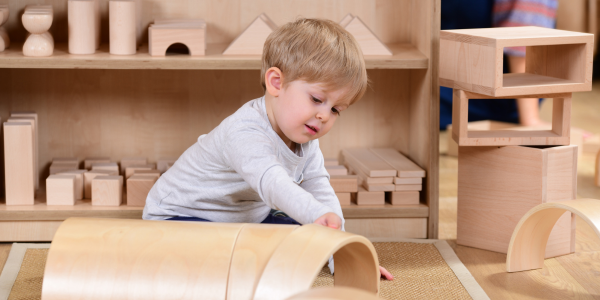In this blog, Phil Armstrong, Senior Education Lead for Early Excellence, explores why blocks are an essential part of early years provision and shows how block play helps children develop physical skills, creativity, problem-solving, and mathematical skills.
When you visit any Early Years classroom the one resource you are guaranteed to find is blocks. In fact, whenever I’m asked what the first resource on my own wish list would be, it’s always blocks!
However, as we develop this aspect of our provision, there are some key questions we need to ask about blocks, as there are with any resource we may provide for the children, including:
- Why do we provide blocks in early years?
- How do blocks connect with the curriculum and children’s interests?
- What should we include in a Block Play Area?
- How can adults support learning to unlock their powerful potential?
Let’s start by exploring what Block Play is, and why it is such a valuable aspect of provision in the early years and beyond.
What is Block Play?
A key element of high-quality provision, we can see Block Play featuring as far back as the 1800’s when blocks were identified by Friedrich Froebel as a set of valuable educational materials, known as ‘Froebel’s Gifts’.
A key feature of Block Play is that it is open-ended. This means that children have the freedom to lead their own learning, working individually or collaboratively to build structures which may be familiar to them, or inspired by creativity and imagination.
Why are Blocks an Essential Part of Provision?
We all know that young children have a natural desire to construct and create, we see this every day as they use the blocks to build new worlds, amazing structures, collaborate on complex designs and bring their ideas to life. However, it is important that we understand where this starts and how it develops over time as children grow in confidence and expertise.
What are the Stages of Block Play?
Let’s reflect for a moment on the work of Harriet Johnson: The Art of Block Building and explore the types or stages of play we might see as children engage with these incredibly versatile resources.
- Stage 1: Blocks are carried around and not being used for construction
- Stage 2: Building begins, mostly placing blocks in rows either horizontal or vertical, with stacking
- Stage 3: Bridging, using two blocks with a space between them, connected by a third block
- Stage 4: Enclosures, with blocks placed to enclose a space, often with small world resources being places within each space
- Stage 5: Designs, patterns and elaborate structures emerge linked to children’s interests
- Stage 6: Large scale co-operation, children plan with a purpose and use what they’ve built as part of extended play activities
Of course, we know that as part of their unique learning journey, children will explore, experiment and investigate resources in a myriad of ways and at different times. However, these stages give us a helpful framework for understanding patterns of play and development.
We can see from these just how easily children of different ages can access block play to build their confidence and expertise as they spend more time accessing these invaluable open-ended resources.
What Learning does Block Play support?
Block Play offers a wealth of learning opportunities across the curriculum in the early years and beyond. This is especially when blocks are provided consistently year on year in a variety of contexts and combined with the potential for story telling through small world or role play.
Here are just a few:
- Physical skills: Fine motor skills and gross motor skills, hand-eye coordination, spatial awareness
- Social & emotional skills: Autonomy, initiative, co- operation
- Language & literacy skills: Vocabulary, beginnings of story re-call
- Mathematical skills: Size, shape, 1-1 correspondence, comparison
- Creative skills: Divergent thinking, imagination
- Scientific skills: Similarities & differences, balance, cause and effect
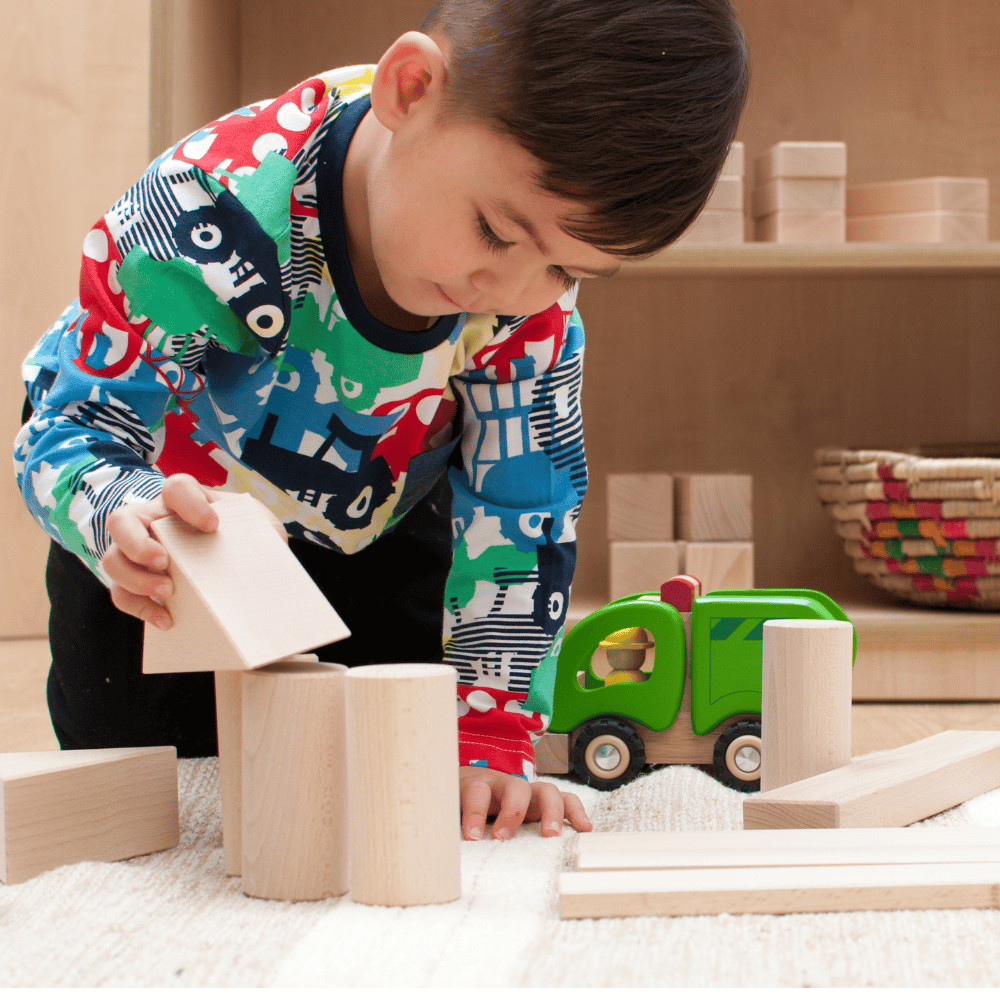
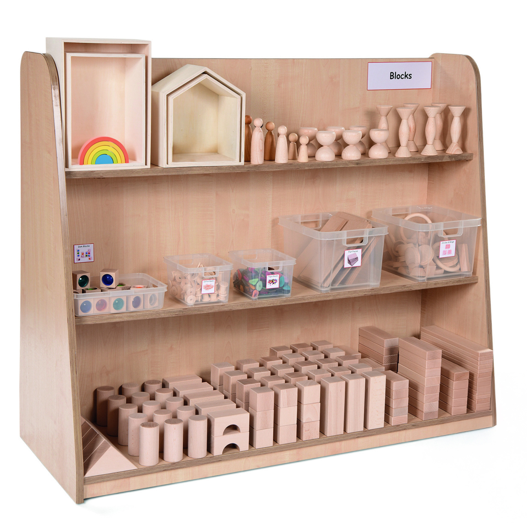
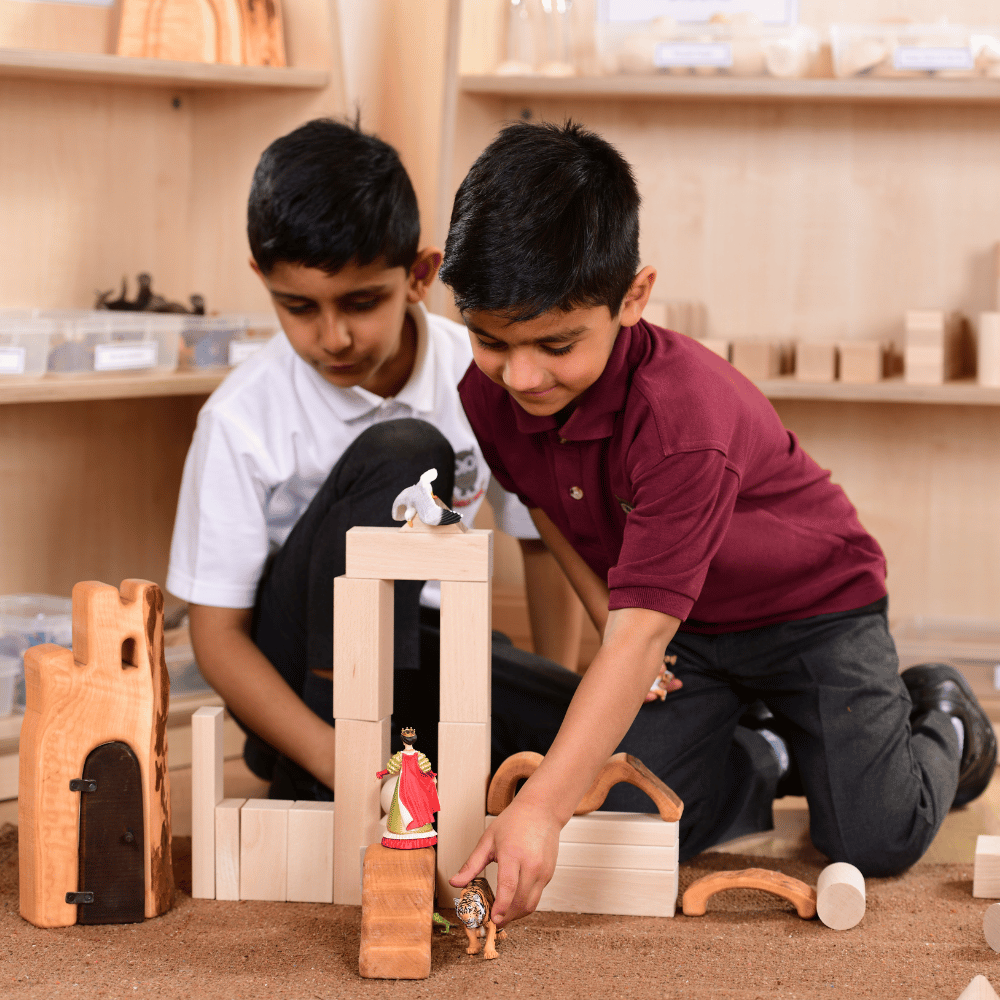
Creating an Effective Block Play Area
The first step to creating an effective Block Play Area in your classroom is choosing the best location. Ideally this should be large enough so groups of children can work collaboratively and not a space which requires the resources to be tidied away repeatedly throughout the day, so that structures the children have built can be developed and refined over time.
We would also suggest combining your block resources with small world resources in the same space. This creates a rich opportunity for the children to bring their own stories to life and deepen language skills, as they bring amazing new worlds from their imagination to life!
What Should be in a Block Play Area?
Block Play provision usually features a variety of resources, appropriate to the ages of the children and rich in opportunities and inspiration. Whether these be large blocks or small blocks, wooden blocks have long featured as a staple of our learning environments.
Here are some examples of what you might include in a Block Play Area,
- A selection of standard blocks including triangular prisms, cylinders, cubes, cuboids, bridges
- A selection of wooden blocks of different shapes such as cones, semi-spheres, spires
Enriching and Enhancing your Block Play Area
Alongside the blocks you may want to include other resources to support, extend and enrich children’s learning and play. These include,
- A selection of accessories to support decoration such as large buttons, milk bottle tops, tagua beads, cotton reels
- A selection of natural wooden materials such as log slices
- A selection of thin boards and planks in various lengths and thicknesses
- A range of building equipment such as spirit levels, measuring tapes, rulers
- You might want to think about enhancements such as mirrored blocks and rainbow blocks
We would also suggest adding a selection of relevant block area books and photographs for the children to access to support with designing building and developing story ideas.
How Might you Organise your Block Play Area?
Key to a successful Block Play Area is carefully considering how you are going to organise the resources to make them accessible to the children as well as inspiring.
When resources are organised effectively it promotes lots of opportunities to embed learning across the day. From sorting to classifying, sequencing to matching – the way you organise resources is a great way to bring your curriculum to life!
When we think about organising blocks, here are some ideas to consider:
- Regular shaped blocks can be silhouetted to support shape recognition
- These can also be organised to support other mathematical concepts such as fractions
- Collections of special blocks (mirrored, coloured etc) and accessories sorted and displayed in plastic trays or baskets
- Group resources together according to their characteristics with discs, buttons, rings, boards, people, etc in their own trays
- You may want to include photographs and/or text for labels linked to the names of the resources
To help you with organising your resources, not just in your Block Play Area, you may find these two videos helpful:
Unlock the Potential of Organising Resources in Early Years Classrooms
Discover our insightful video which explains how you can organise resources using ‘shadowing’. Gain insight into how the principles of ‘organising for learning’ enable us to further unlock the potential of resources across classroom provision.
Everyday Maths: Exploring how ‘Tidy-Up Time’ can be Full of Rich Mathematical Learning Opportunities
Investigate practical tips on how to display, label and organise resources, such as blocks, in ways that promote mathematical thinking and embed prior learning.
How can Adults Support Block Play?
The key to unlocking the potential of any resource we offer is our understanding of child development and how children’s innate desire to experiment supports learning over time, along with our knowledge of the curriculum.
Both of these strands guide how we interact with children as they experiment and create. As we play alongside children in the Block Area, we:
- Observe and take note of their key interests and fascinations
- Respond to their requests and ideas
- Sensitively suggest possibilities to extend their play and thinking
- Model language and extend vocabulary
- Support with the development of imaginative play
As we role model we are able to:
- Model how to think aloud by making comments such as ‘I’ve not thought about that before’, ‘You’ve really made me think about…’, ‘How might I…’
As we sensitively raise questions our purpose is to:
- Stimulate ideas and add challenge with questions such as ‘What do you notice about?’, ‘I wonder how?’
And when we are able to mobilise ourselves to teach effectively in these ways, we can unlock the power of our provision.
Suggested Next Steps
It’s always good to take a step back and find time to review your Block Area considering how your children are using the resources and how their skills are developing over time.
Reflect on your shared understanding of how blocks provide learning opportunities across your curriculum and consider how confident you and your team are at drawing on this understanding when interacting with the children.
Why not take a listen to our podcast on Block Play and Small World Play:
Also, for more ideas and inspiration take a look at our curated complete Small Block Areas and Large Blocks Areas, or explore our exciting range of Wooden Blocks and Rainbow Blocks.
Above all, enjoy being a partner in play and learning in your Block Area, a truly powerful part of provision.
By Phil Armstrong, Senior Education Lead, Early Excellence
Find Out More
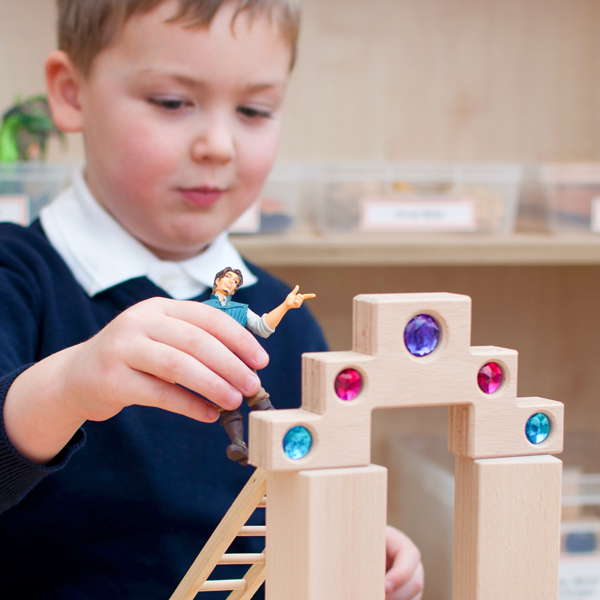
Download our free Block Area Planning Guide for inspiration on how to develop a well organised block area which promotes imaginative thinking and open-ended exploration.
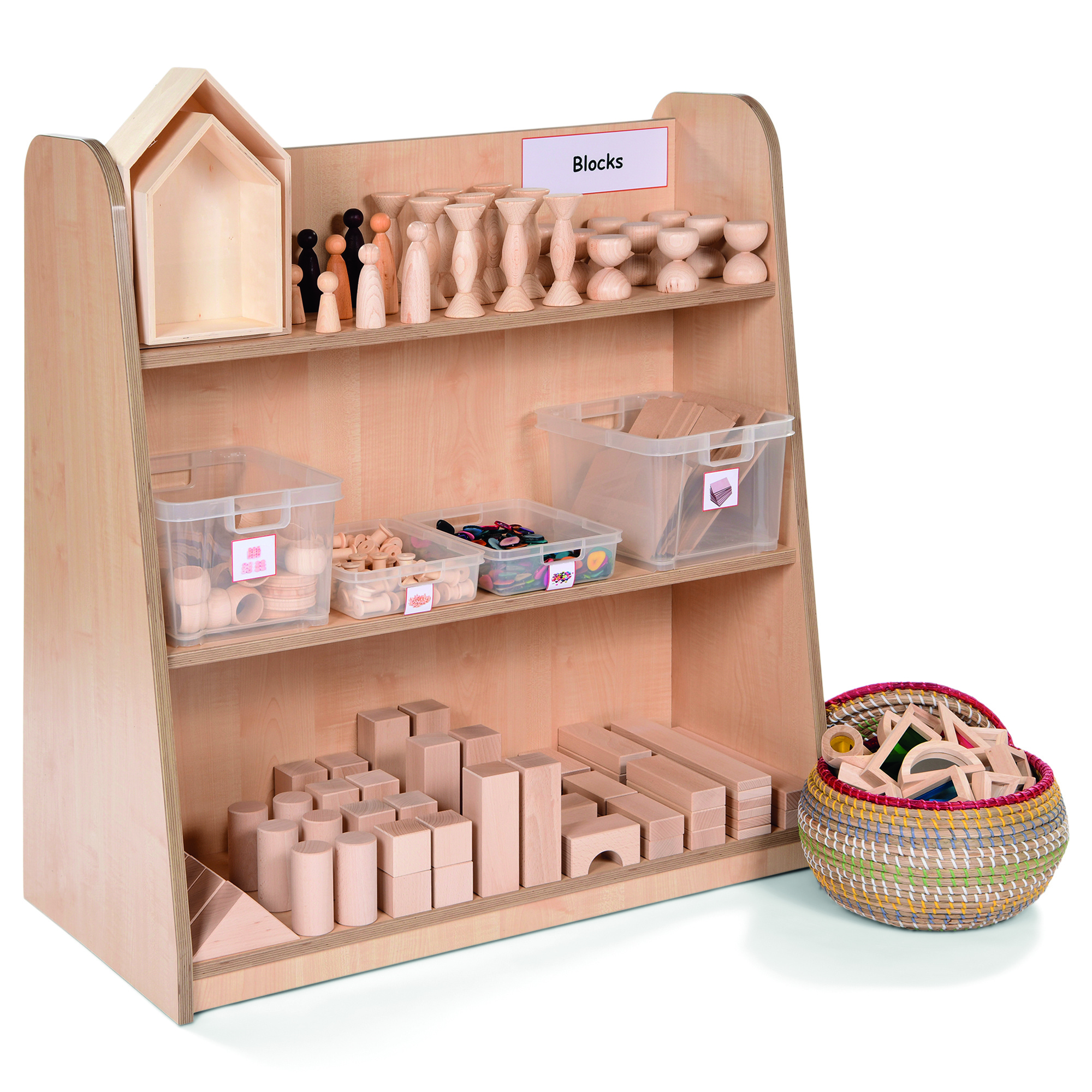
Support open-ended exploration and imaginative block play with our range of open-ended block resources for both Early Years and Key Stage One classrooms.
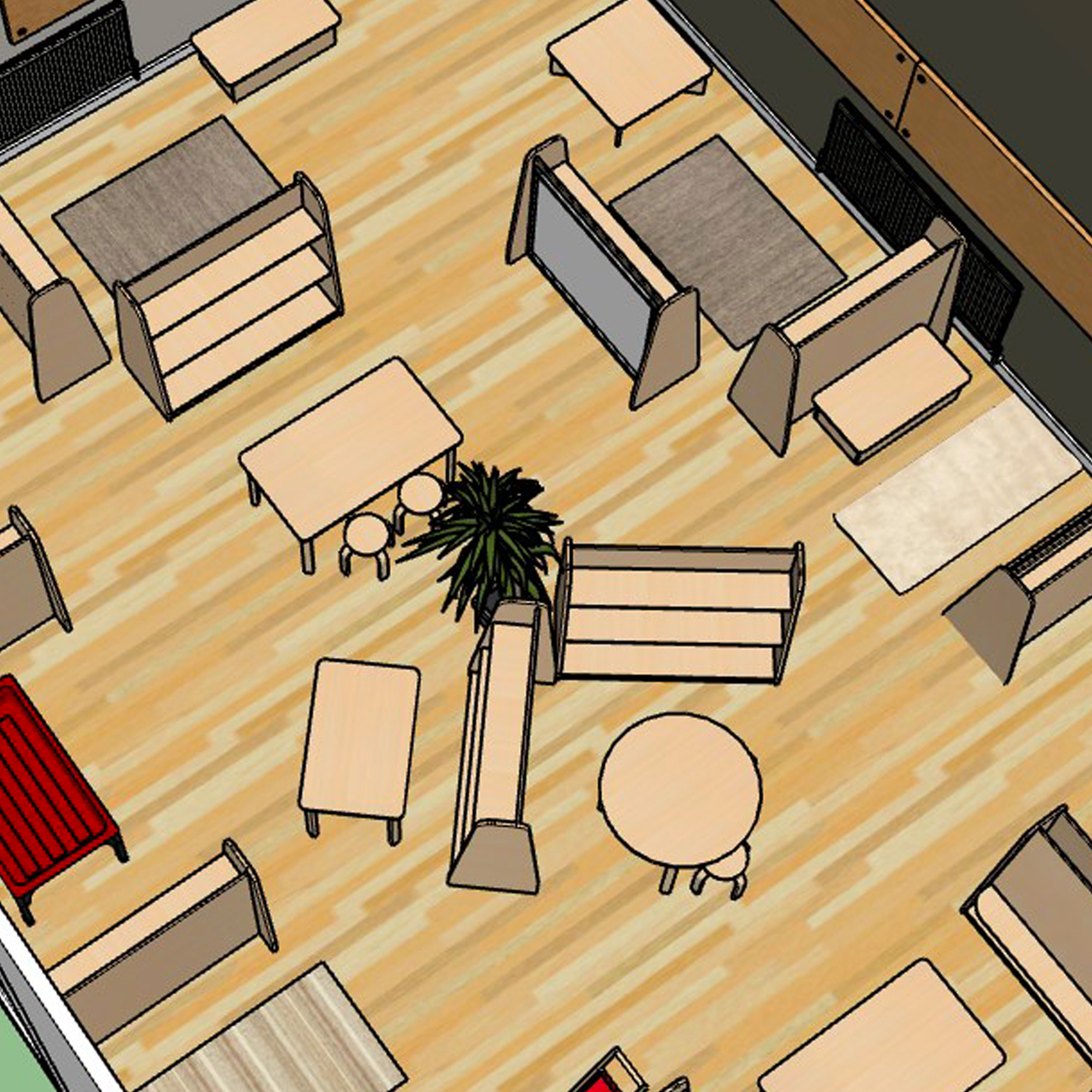
If you are refreshing your learning environment fully, our free room planning service can help you to create an inspirational vision for your classroom space.

